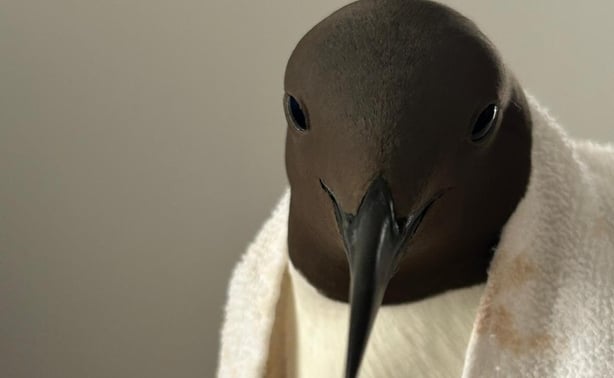The Oiled Wildlife Response Network and Kildare Wildlife Rescue have said they need thousands of litres of fresh water, as well as more equipment, in order to help clean oiled seabirds.
More than 100 guillemots and razorbills were discovered on beaches along Dublin, Wicklow and Wexford two weeks ago with oil on their feathers.
It is not known where the oil came from.
Kildare Wildlife Rescue has taken in 93 living oiled seabirds - mostly guillemots - but it does not have the necessary equipment to clean and rehabilitate the animals or the money to purchase it.
A further 50 birds were brought into the charity dead, and some have been euthanised as their blood results determined they would not survive the cleaning process.
Funding of €50,000 has been promised by Minister of State with Responsibility for Nature Malcolm Noonan.
The minister described the situation along the east coast as "shocking and extremely concerning".
Speaking on RTÉ's Morning Ireland, he said investigations are ongoing to find out how the sea birds came to be covered in oil.
He said additional funding is being given to Kildare Wildlife Rescue and other organisations for the work they have carried out.
Pauline Beades, training coordinator for Oiled Wildlife Response Network, has said however that neither her organisation nor Kildare Wildlife Rescue have been told how to access the funding.
Ireland does not have a national wildlife plan in place in the event of an oil spill.
"So now there's a scramble for items," Ms Beades said.
Kildare Wildlife Rescue particularly needs more pools for the washed birds as well as clean water.
A spokesperson for the minister said that they are aware of the issue in relation to funding and the Department of Heritage is working with NGOs involved in wildlife rehabilitation to come up with a solution.
They added: "The minister is committed to supporting the rescuers and rehabbers who are doing this vital work and has made emergency funding available for this purpose. He understands that they are engaging with the department at the moment".
Need for water
The main issue is that they do not have enough water to clean the birds. Ms Beades estimates between 20,000 and 30,000 litres will be needed by Kildare Wildlife Rescue.
Volunteers at Kildare Wildlife Rescue are being trained in how to wash the birds.
Of the 93 birds in Kildare Wildlife Rescue's care, just eight were cleaned yesterday.
"It's a long intense process," Ms Beades explained.
Guillemots have a fragile frame and they are not meant to sit for long periods of time on a solid surface as their bodies are designed to rest on water.

Just a small amount of oil on their feathers can ruin the waterproofness of their feathers and reduce their body temperature.
"This situation is very distressing for the birds," Ms Beades said.
Once the birds are washed, they need to be put in a clean pool of water where they have time and space to preen their feathers to clean them further.
That water needs to be changed regularly as oil, feathers and fish enter the pool.
"It's a very stressful process for them," Ms Beades added.
"The longer they are in captivity, the more likely they are to have secondary problems.
"Some birds will be able to maintain their weight and health, but some will crash," she said.
No known source for the oil
Wicklow County Council has said that it is observing the coastline where oiled birds were reported.
"The presence of oiled birds was confirmed on the beaches at Greystones North and Brittas Bay North," the statement added.
"The National Parks and Wildlife Service and Kildare Wildlife Rescue have particular expertise in this area, and as the organisations with responsibility for wildlife, liaison with them is ongoing."
Wexford County Council was also asked for comment.
In a statement, the Environmental Protection Agency said that it is engaging with both local authorities in Wicklow and Wexford.
"At present the EPA is not directly involved in this investigation but we have offered our assistance and support as required," the statement said.







